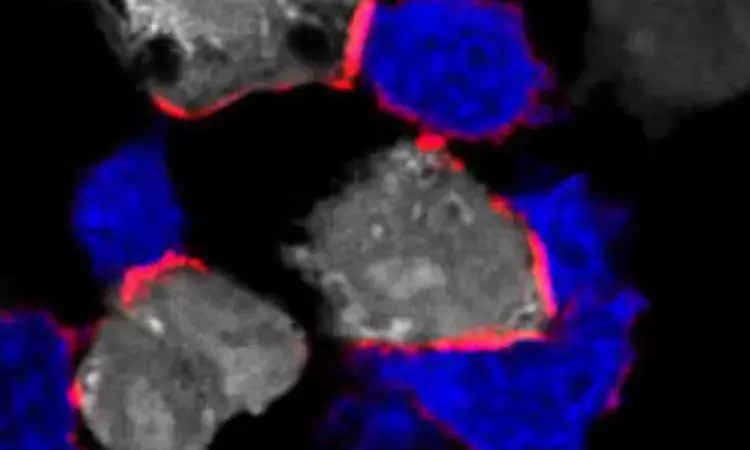- Home
- Medical news & Guidelines
- Anesthesiology
- Cardiology and CTVS
- Critical Care
- Dentistry
- Dermatology
- Diabetes and Endocrinology
- ENT
- Gastroenterology
- Medicine
- Nephrology
- Neurology
- Obstretics-Gynaecology
- Oncology
- Ophthalmology
- Orthopaedics
- Pediatrics-Neonatology
- Psychiatry
- Pulmonology
- Radiology
- Surgery
- Urology
- Laboratory Medicine
- Diet
- Nursing
- Paramedical
- Physiotherapy
- Health news
- Fact Check
- Bone Health Fact Check
- Brain Health Fact Check
- Cancer Related Fact Check
- Child Care Fact Check
- Dental and oral health fact check
- Diabetes and metabolic health fact check
- Diet and Nutrition Fact Check
- Eye and ENT Care Fact Check
- Fitness fact check
- Gut health fact check
- Heart health fact check
- Kidney health fact check
- Medical education fact check
- Men's health fact check
- Respiratory fact check
- Skin and hair care fact check
- Vaccine and Immunization fact check
- Women's health fact check
- AYUSH
- State News
- Andaman and Nicobar Islands
- Andhra Pradesh
- Arunachal Pradesh
- Assam
- Bihar
- Chandigarh
- Chattisgarh
- Dadra and Nagar Haveli
- Daman and Diu
- Delhi
- Goa
- Gujarat
- Haryana
- Himachal Pradesh
- Jammu & Kashmir
- Jharkhand
- Karnataka
- Kerala
- Ladakh
- Lakshadweep
- Madhya Pradesh
- Maharashtra
- Manipur
- Meghalaya
- Mizoram
- Nagaland
- Odisha
- Puducherry
- Punjab
- Rajasthan
- Sikkim
- Tamil Nadu
- Telangana
- Tripura
- Uttar Pradesh
- Uttrakhand
- West Bengal
- Medical Education
- Industry
Magnesium essential for immune system, including in the fight against cancer

The level of magnesium in the blood is an important factor in the immune system's ability to tackle pathogens and cancer cells. Writing in the journal Cell, researchers from the University of Basel and University Hospital Basel have reported that T cells need a sufficient quantity of magnesium in order to operate efficiently. Their findings may have important implications for cancer patients.
Magnesium deficiency is associated with a variety of diseases, such as infections and cancer. Previous studies have shown that cancerous growths spread faster in the bodies of mice when the animals received a low-magnesium diet – and that their defense against flu viruses was also impaired. However, there has so far been little research into how exactly this mineral affects the immune system.
Now, researchers led by Professor Christoph Hess, from the Department of Biomedicine at the University of Basel and University Hospital Basel and the Department of Medicine at the University of Cambridge, have discovered that T cells can eliminate abnormal or infected cells efficiently only in a magnesium-rich environment. Specifically, magnesium is important for the function of a T cell surface protein called LFA-1.
LFA-1 acts as a docking site, which plays a key role in the activation of T cells. "However, in the inactive state this docking site is in a bent conformation and thus cannot efficiently bind to infected or abnormal cells," Christoph Hess explains. "This is where magnesium comes into play. If magnesium is present in sufficient quantities in the vicinity of the T cells, it binds to LFA-1 and ensures that it remains in an extended – and therefore active – position."
Potentially important findings for cancer patients
The fact that magnesium is essential for the functioning of T cells may be a highly significant finding for modern cancer immunotherapies. These therapies aim to mobilize the immune system – in particular cytotoxic T cells – to fight cancer cells. In experimental models, the researchers were able to show that the immune response of T cells against cancer cells was strengthened by an increase in the local magnesium concentration in tumors.
"In order to verify this observation clinically, we're now looking for ways to increase the concentration of magnesium in tumors in a targeted manner," Christoph Hess says. The promising nature of these strategies is demonstrated by further analyses performed by the research team working with Christoph Hess and his Postdoc, Dr. Jonas Lötscher, lead author of the study. Using data from previously completed studies of cancer patients, the researchers were able to show that immunotherapies were less effective in patients with insufficient levels of magnesium in their blood.
Whether a regular intake of magnesium impacts the risk for developing cancer is a question that cannot be answered based on the existing data, says Lötscher. "As a next step, we're planning prospective studies to test the clinical effect of magnesium as a catalyst for the immune system."
Hina Zahid Joined Medical Dialogue in 2017 with a passion to work as a Reporter. She coordinates with various national and international journals and association and covers all the stories related to Medical guidelines, Medical Journals, rare medical surgeries as well as all the updates in the medical field. Email: editorial@medicaldialogues.in. Contact no. 011-43720751
Dr Kamal Kant Kohli-MBBS, DTCD- a chest specialist with more than 30 years of practice and a flair for writing clinical articles, Dr Kamal Kant Kohli joined Medical Dialogues as a Chief Editor of Medical News. Besides writing articles, as an editor, he proofreads and verifies all the medical content published on Medical Dialogues including those coming from journals, studies,medical conferences,guidelines etc. Email: drkohli@medicaldialogues.in. Contact no. 011-43720751


